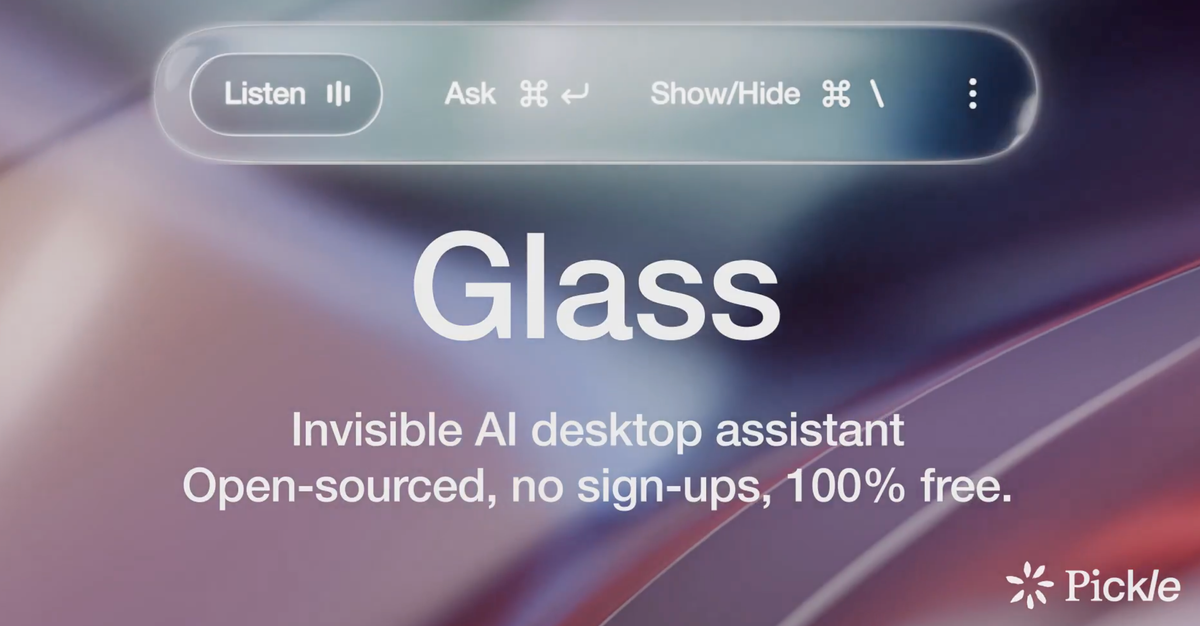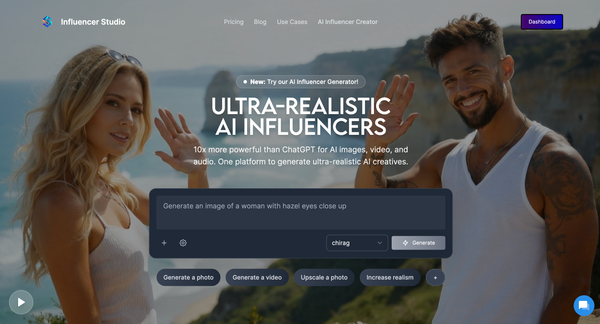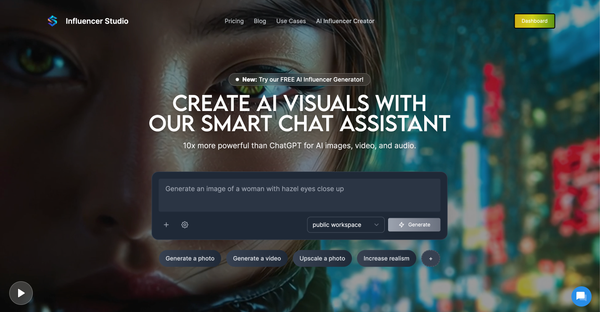Cluely vs Glass and how Open Source Marketing = Virality

A team quietly dropped a new project called Glass—an open-source desktop AI meeting assistant that mimics Cluely’s core functionality... but with no paywall, cleaner UX, and full transparency.
In just 4 days, they shipped a working version of Cluely’s paid product—and made it 100% free on GitHub.
PS: Wanna see my breakdown on Cluely?
They're taking the viral playbook popularized by Cluely and turned it against them. The founder Daniel Park is running a genius move - hopping on the Cluely hype and using it to prop up his own business - Pickle.
He even tweeted to Cluely founder, Roy in a snarky little intro tweet and called him out saying "distribution isn't the moat, velocity is."

What is Glass?
Glass is a real-time AI meeting assistant that listens in on your meetings (via mic or screen capture), processes what's going on, and gives you automatic notes, summaries, and action items.
If that sounds familiar, it’s because that’s exactly what Cluely does. But while Cluely charges $20/month just to view past notes, Glass is completely free and open source.
- Free to use
- Bring your own OpenAI key or use theirs
- Completely open-source
- Local LLMs coming soon for privacy and cost savings
They’re not hiding the code. They're not hiding features. They’re not charging you to access your own data.
Why Open-Source? Why Now?
In a world dominated by proprietary AI tools locking up user data and putting paywalls on basic functionality, open-source AI is gaining traction fast—and for good reason:
- Trust: If your assistant sees your screen and listens to your meetings, you should be able to read the code.
- Modularity: Developers want to customize their stack, not get boxed into someone else’s UX decisions.
- Speed: Closed companies often move slow. Open-source teams ship fast and in public.
The creators of Glass even said it themselves:
“We’re not doing this for hype. Our mission is to build a living digital clone for everyone. Glass is Step 1—a trusted pipeline that turns your daily data into a scalable clone.”
It’s not about notes. It’s about building personal infrastructure.
The Open-Source Playbook (and Why It Works)
Glass isn’t the first to take this route. In fact, some of the biggest success stories in tech today started the same way:
Supabase → Open-source Firebase
Firebase was closed and inflexible. Supabase launched as a Postgres-first, open alternative—and exploded in popularity. Now it powers thousands of SaaS apps.
LangChain → Modular LLM Framework
LangChain provided an open-source playground for chaining LLMs together—before OpenAI released Function Calling or Agents. It became the default dev tool for building LLM apps.
AutoGPT → Viral Proof-of-Concept
AutoGPT was rough, chaotic, and sometimes useless. But because it was open-source and modifiable, it went viral—and sparked the entire autonomous agents movement.
PostHog
An open-source alternative to product analytics tools like Mixpanel or Amplitude.
They grew rapidly in the developer community by being self-hostable, privacy-compliant, and transparent. The OSS version acts as a funnel to their cloud-hosted enterprise plan.
Cal.com
Formerly Calendso, Cal.com is an open-source Calendly alternative.
They positioned themselves as “the scheduling infrastructure for everyone” and gained traction by offering extensibility + on-prem options for teams with security concerns.
Meilisearch
A blazing-fast, open-source search engine designed as a dev-friendly alternative to Algolia.
Meilisearch’s transparency and performance helped it grow organically in the dev world, later monetizing via hosted infrastructure.
Plausible Analytics
A Google Analytics alternative that’s privacy-first and fully open-source.
Plausible gained a cult following by appealing to the anti-tracking, GDPR-compliant crowd. Their OSS model built trust; their hosted service monetized it.
Highlight.io
An open-source session replay + observability platform competing with LogRocket and FullStory.
Their rapid OSS release strategy helped them stand out in a crowded observability market.
n8n
An open-source Zapier alternative that grew by appealing to power users and devs who needed automation but with full control.
Their core product is free and hackable; monetization happens via hosted plans.
ToolJet
An open-source internal tool builder similar to Retool.
Developers adopted ToolJet for self-hosting and customization, making it a top choice for internal admin tools without vendor lock-in.
Outline
An open-source team knowledge base (Notion alternative) built for teams that value markdown and privacy.
Grew through organic GitHub discovery and dev word-of-mouth. Offers a hosted version for ease of use.
Chatwoot
An open-source customer support platform (Intercom competitor).
Chatwoot built initial traction through GitHub and indie hacker communities, growing to power support systems for privacy-focused startups and SMBs.
DuckDB
An open-source OLAP database designed for analytics.
While not a monetized SaaS product directly, DuckDB’s open release attracted mass adoption among data engineers, earning mindshare and positioning it as the “SQLite for analytics.”
What This Means for Cluely
Let’s be clear: Cluely isn’t going anywhere yet. They’ve got brand recognition, funding, and users.
But the moat just got thinner.
When a fast-moving team can clone your core experience, open-source it, and improve it within 4 days—you better have a stronger differentiator than UI polish and a paywall.
If Glass continues shipping rapidly (especially with local LLMs + privacy-first positioning), Cluely will have to either:
- Lower prices and open up,
- Offer significantly better features, or
- Get swallowed up by the OSS wave.
The Future: Digital Clones, Not Just Notes
What excites me most isn’t just that Glass is cheaper or open. It’s the vision behind it:
A “living digital clone” that learns from your daily activity.
That means meetings, yes—but eventually also emails, screen usage, habits, task management. A personal infrastructure layer, like what Rewind and Humane hint at, but actually open and controllable.
The Glass team isn’t building just another AI app. They’re quietly laying the foundation for the next level of personal computing.
Chapter: Glass Is a Marketing Engine for Pickle
Glass is not the final product. It’s a strategic entry point into a larger platform: Pickle.
While Glass functions as a standalone AI meeting assistant, it’s ultimately a tool designed to bring visibility to Pickle’s long-term goal — building a user-owned AI memory infrastructure.
By open-sourcing Glass, the team is executing a clear growth strategy:
- Build awareness through a free, competitive alternative to Cluely
- Earn trust via transparency, developer-friendly tooling, and real usability
- Drive interest toward Pickle, which aims to offer a full pipeline for turning user data into personalized AI
This method prioritizes user adoption and community credibility over traditional paid advertising or enterprise sales cycles.
How It Works
The team behind Pickle is using Glass to:
- Capture developer mindshare
Open-source releases attract builders, engineers, and early adopters who value customization and transparency. - Disrupt a category with low friction
Instead of marketing against Cluely directly, they provide a working replacement that is more accessible, flexible, and affordable. - Collect feedback and improve quickly
Shipping Glass in the open enables faster iteration and more authentic community engagement, which benefits both the product and the Pickle brand. - Guide users toward a broader platform
As users adopt Glass, they are introduced to the larger vision of Pickle — a system that will eventually include support for local LLMs, personalized workflows, and long-term memory layers.
This Is a Go-to-Market Strategy
Releasing Glass isn’t a side project or a temporary launch stunt. It’s a deliberate part of Pickle’s go-to-market plan. The team is using it to:
- Validate demand for personal AI infrastructure
- Build trust through openness
- Accelerate product-market fit
- Differentiate from incumbents who operate behind closed-source code and rigid pricing
Rather than compete through messaging, Pickle is competing through execution.
Final Thoughts
We’re watching a new AI playbook unfold:
- Clone a closed, high-demand product
- Strip out the paywalls
- Open-source the whole thing
- Move fast, build in public, and earn developer trust
This is open-source not as a side project—but as a deliberate go-to-market strategy.
Glass vs Cluely might be the first real open-source battle in the AI assistant space.
And if the history of Supabase, LangChain, and AutoGPT is any indicator… open might win.




